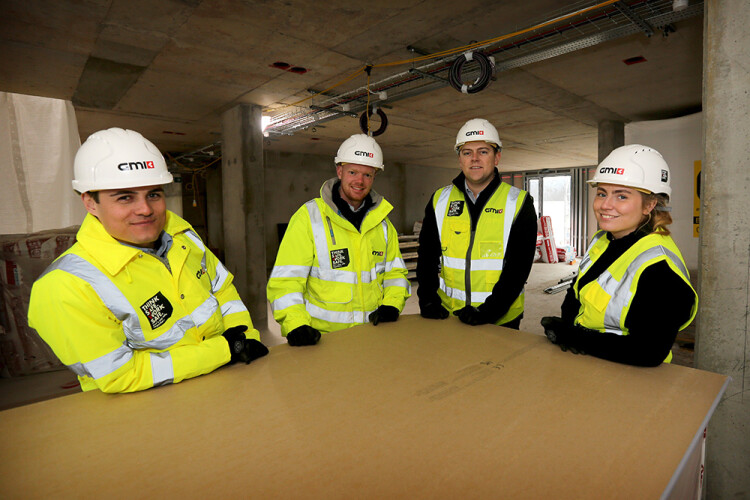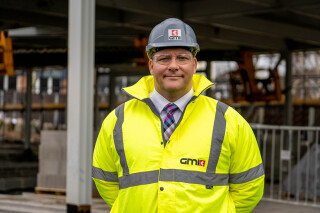Since becoming chief executive of GMI Construction Group in January 2022, Lee Powell has had a lot on his mind. The company is growing rapidly – 200% growth last year, in fact.
One of the big questions is... how to maintain that trajectory without losing the cohesiveness of the team
When he made the step up from being divisional managing director for the company’s Yorkshire regional operation to become chief executive, the company had just posted turnover of £120m for the previous financial year. In the subsequent year – the year to 30th September 2022 – it reached £360m. The 10-year vision is to hit £750m-£800m.
At the time of his appointment, Powell said: “I am consciously aware that GMI needs to implement that growth by retaining those values that have delivered success to this company and our clients.”
As chief executive he has been giving a lot of thought to the corporate culture – how best to protect and nurture it.
“I never thought that as a young go-getting QS I’d end up more concerned about culture [than money]. But that’s the bit I agonise about,” he says. “If you crack that, everything else falls into place.”
It was while listening to a business podcast, Enter the Boardroom with Nurole, that Powell first heard about shadow boards – a way of bringing the insight of Millennials into the boardroom and developing young talent.
Fashion house Gucci has had Millennial employees work directly with senior executives in the form of a shadow boards since 2015. Its sales have since soared. AccorHotels turned to its twentysomethings to figure out how to address the threat of Airbnb. Finnish paper and packaging company Stora Enso has also embraced the concept. As far as we can tell, however, GMI is the first construction company (in the UK at least) to have a shadow board.
Balfour Beatty has reverse mentoring, a similar but different way of ensuring that long-in-the-tooth, potentially cynical executives are kept in touch with the revolutions of the modern world by pairing them up with junior employees for regular one-on-one meetings. But shadow boards expose juniors to the entire executive team and its processes.
GMI’s shadow board comprises four twentysomethings – one from each of the company’s regions (Yorkshire, Midlands, Northwest and Northeast) – who have been identified as showing leadership potential.
Each regional managing director put forward four likely candidates, together with a synopsis of why they had been nominated. From the 16 nominations, Lee Powell himself selected one from each region.
They are design manager Rhion Scullion, representing the Midlands, quantity surveyor James Cannings, representing the Northeast and site managers Matthew Foster and Rebecca Shiels from Yorkshire and the Northwest respectively.
They will each serve one year in the role before, according to current plans, four others are picked in 2024.
Officially, the company line is that the purpose of the shadow board is to provide GMI’s young talent with an opportunity to showcase their abilities to the board of directors, as well as to observe the strategic leadership of the business. It also shows a commitment to fostering young talent by promoting from within the business.
Unofficially, Powell is hoping the young pups will teach the old dogs a thing or two. “I thought it would be great if we could get some younger talent into the room with fresh ideas and a new perspective,” he says.
“In construction we’re all a bit of a certain age, a certain demographic. It can be a bit of an echo chamber.”
Powell began his career in the mid-1990s as a quantity surveyor, sponsored by Tarmac (before it became Carillion). He says that there were similar initiatives as part of his training. They were not called shadow boards then but he was made to feel, even as a young man starting out, that his opinion actually counted.

He hopes – believes – that GMI has this same culture. It is not just the chosen four on the shadow board that have a voice, he says: “Everybody has a say through their line manager and the reporting structure.”
As it expands, GMI has necessarily had to grow its human resources department and has recently taken on a learning and development manager as part its commitment to staff development.
“We are currently Investor in People silver and going for gold this year,” Powell says.
To give focus to the shadow board initiative, the tyros have been given a very specific task. “I put a challenge down to the shadow board to save us £1m from operating costs,” Powell says. “They’ve got until the end of our financial year, 30th September.”
Powell has asked the four regional managing directors to give each shadow board member two hours a week off their standard work so that they can work on exploring corporate efficiencies.
A spin-off benefit is the attention that GMI has generated. “We definitely didn’t do this for the media coverage but that has helped,” Powell says.
“It puts us on the radar. Talent around the industry will be wanting to come and work for us. And it’s an alert for clients too, that we are constantly trying to improve.”
GMI’s business plans
Lee Powell’s plans for GMI include reducing dependency on private sector clients and, in time, regional expansion.
The current portfolio is one third in industrial/logistics (big sheds), one third accommodation (student accommodation, build-to-rent and hotels), and one third commercial building (offices and retail). Contracts range in value from £10m up to £80m currently – the latter an office building under construction in Manchester city centre.
It is a balanced portfolio except for the reliance on private sector clients, leaving the business overly exposed to economic turbulence.
“A hundred percent of what we do is private sector now,” he says. “But we are now getting on public sector frameworks. I want a third of our business to be in the public sector.”
Earlier this year GMI secured a place on the Pagabo medium works framework.
Powell also has regional expansion in mind. GMI has four offices today, in Leeds, Manchester, Birmingham and Stockton-on-Tees. There are no firm plans yet but the aspiration is to open somewhere in the southwest and somewhere in the Reading/M4 belt.
GMI Construction is also starting to self-deliver. It still sub-contracts everything out and has no directly employed site labour but in order to take greater control of costs it has started to buy material itself and appoint its own labour force from agencies. It is a move that has been working well, Powell says.
As for diversification into different industrial sectors, that is not a priority. Whereas Winvic, a similarly fast-growing ‘beds-and-sheds’ specialist, has got itself onto National Highways’ scheme delivery framework, GMI has no plans to move into highways and civil engineering.
Not yet, at least.
Got a story? Email news@theconstructionindex.co.uk




